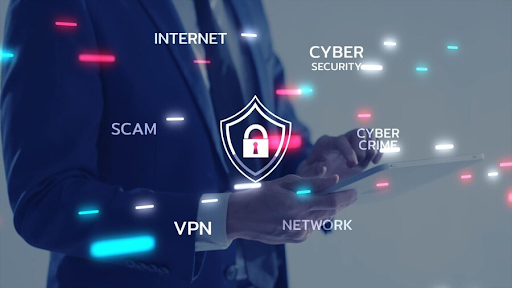We live in an era where our lives are increasingly intertwined with the digital realm. From managing finances to maintaining social connections, the Internet has become a critical lifeline. Yet, this reliance on digital spaces also brings a vulnerability to cyber threats, a concern that keeps many of us awake at night.
One tool that often comes to our rescue is the VPN (Virtual Private Network). Promising anonymity and security, VPNs are heralded as the superheroes of the cyber world. But are they truly invincible? Or are there certain cyber evils they can't conquer?
This article takes you on an enlightening journey, shedding light on the cyber threats a VPN can effectively shield you from, and importantly, those it cannot. With this knowledge, you can better equip yourself, not just with technology, but with the right mindset to navigate through the perilous digital landscape.
The Role of VPNs in Cybersecurity
![]()
A VPN is a technology that encrypts your internet connection, disguising your online activities and making your data unreadable to any eavesdroppers. It also hides your IP address, making it seem like your internet traffic is coming from a different location. VPNs are often used to ensure privacy and anonymity online, and they offer a first line of defense against certain cyber threats. Read our Tunnelbear VPN review to know how the VPN can make your information secure against cyber threats.
The most common threats a VPN can protect you against
Curious about the cyber threats that a VPN can shield you from? Here is a quick summary of the cyber threats VPNs can effectively prevent.
-
Cookie Theft:
Cookies are small files that websites store on your device to remember your preferences and provide a personalized browsing experience. However, cybercriminals can exploit cookies to gain unauthorized access to your accounts or track your online activities.
VPNs can protect you from cookie theft by encrypting your internet connection, making it significantly more challenging for hackers to intercept and steal cookies. When your connection is encrypted, even if a hacker manages to intercept your traffic, they won't be able to decipher the encrypted data and extract sensitive information stored in cookies.
-
Fake WAP:
Fake Wireless Access Points (WAPs) are malicious networks set up by hackers to deceive users into connecting to them, thinking they are legitimate networks. Once connected, hackers can intercept and monitor your internet traffic, capturing sensitive data such as login credentials.
VPNs provide protection against fake WAPs by encrypting your connection. When you connect to a fake WAP, the VPN encrypts your data, making it unreadable to the attacker. This ensures that even if you unknowingly connect to a malicious network, your data remains secure and inaccessible to hackers.
-
Man-in-the-Middle Attacks:
Man-in-the-Middle (MitM) attacks refer to intercepting communication between two parties to eavesdrop, manipulate, or steal sensitive information.
VPNs play a vital role in defending against MitM attacks. By encrypting your data and creating a secure tunnel between your device and the server you're accessing, VPNs make it extremely difficult for attackers to intercept or manipulate the data being transmitted.
Even if an attacker manages to intercept the data, the encrypted information remains unreadable and unusable to them. This ensures the integrity and confidentiality of your communications, protecting you from MitM attacks.
-
DoS/DDoS Attacks:
Denial-of-Service (DoS) and Distributed Denial-of-Service (DDoS) attacks aim to disrupt or disable a network or website by overwhelming it with a flood of traffic. While VPNs cannot directly prevent these attacks, they can help mitigate their impact.
VPNs route your internet traffic through their servers, which often have robust security measures in place. These measures include traffic filtering and load balancing capabilities, which can help identify and block malicious traffic associated with DoS/DDoS attacks. By redirecting your traffic through VPN servers, the impact of such attacks on your device or network can be minimized.
-
Remote Hacking:
Remote hacking involves unauthorized access to your device or network by exploiting vulnerabilities in your system. While VPNs provide an additional layer of security, they cannot guarantee protection against remote hacking if your device or network has unpatched vulnerabilities or weak security measures.
VPNs primarily secure your internet connection by encrypting your data and hiding your IP address, making it more difficult for attackers to target you directly. However, it is crucial to maintain the security of your devices and networks by keeping them up to date with the latest security patches, using strong and unique passwords, enabling firewalls, and implementing other security best practices in addition to using a VPN. These measures collectively contribute to a comprehensive cybersecurity posture.
Which cyber threats can a VPN not prevent?
While VPNs are effective tools for enhancing online security and privacy, there are certain cyber threats that they cannot fully prevent. Understanding the limitations of VPNs is essential for maintaining a comprehensive cybersecurity strategy. So, let’s explore some of the cyber threats that VPNs may not be able to protect against:
-
Endpoint Attacks:
While VPNs offer encryption and protection for data in transit, they cannot defend against attacks targeting vulnerabilities in the endpoints, such as malware-infected devices or compromised software. Users must ensure their devices and applications are up-to-date with the latest security patches to mitigate these risks.
-
Social Engineering Attacks:
Social engineering attacks revolve around manipulating individuals to disclose sensitive information or engage in actions that compromise security. VPNs do not provide protection against such attacks.
These attacks rely on human interaction rather than technical vulnerabilities, making it important for users to remain vigilant and practice good cybersecurity hygiene. This includes being cautious of phishing emails, not sharing personal information with unknown individuals or websites, and verifying the authenticity of requests before taking any action.
-
Physical Security Breaches:
VPNs primarily focus on securing online connections and data transmissions. They cannot protect against physical security breaches, such as unauthorized access to devices or theft of physical storage media. Users should take necessary precautions to safeguard their devices and implement strong authentication methods, such as passwords or biometric locks to prevent unauthorized physical access.
-
Insider Threats:
Insider threats involve individuals with legitimate access to systems or networks who misuse their privileges for malicious purposes. While VPNs can protect data during transmission, they cannot prevent authorized users from abusing their privileges or leaking sensitive information. Organizations should implement robust security measures, such as access controls and monitoring systems to mitigate insider threats effectively.
-
Advanced Persistent Threats (APTs):
APTs are sophisticated and targeted cyber attacks carried out by skilled adversaries, often state-sponsored or highly organized groups. These attacks involve multiple stages, including reconnaissance, infiltration and exfiltration of data. While VPNs offer encryption and secure connections, they may not be sufficient to detect or prevent advanced persistent threats. Combating APTs requires a comprehensive security strategy that includes advanced threat detection systems, network monitoring and user awareness training.
-
Human Errors:
VPNs cannot fully mitigate the risks associated with human errors. Users may inadvertently download malicious files or click on suspicious links, leading to malware infections or other security breaches. It is crucial for individuals to exercise caution and employ safe browsing habits, such as avoiding suspicious websites, refraining from downloading files from untrusted sources, and regularly updating antivirus software.
-
Malware:
While VPNs protect your data during transit, they cannot prevent malware from infecting your device. Malware is often delivered through various means, such as clicking on pop-up ads or opening links in suspicious emails. Once the malware successfully infiltrates your device, it can give hackers direct access to your data, even if it's encrypted while in transit through the VPN.
It's important to understand that VPNs primarily focus on securing your internet connection and protecting your data from interception by unauthorized parties. However, they do not provide comprehensive protection against malware that is already present on your device.
Conclusion
VPNs provide protection against cyber threats such as malware, cookie theft, fake WAPs and man-in-the-middle attacks by encrypting your internet connection. They can also help mitigate the impact of DoS/DDoS attacks. However, VPNs cannot prevent endpoint attacks, social engineering attacks, physical security breaches, insider threats, APTs, human errors, or existing malware.
To enhance your security, use strong passwords, enable two-factor authentication, keep software updated, use firewalls and antivirus software, secure your router, be cautious with email attachments, avoid public Wi-Fi, regularly back up data and stay informed about social engineering tactics.
If you are looking forward to using a VPN, you can find endless numbers of options. However, choosing the right one is not an easy task. So, at VPNguide.com, we provide comprehensive reviews of VPNs. Explore our website to know which VPN is ideal for protecting you from hackers and cybercriminals.

